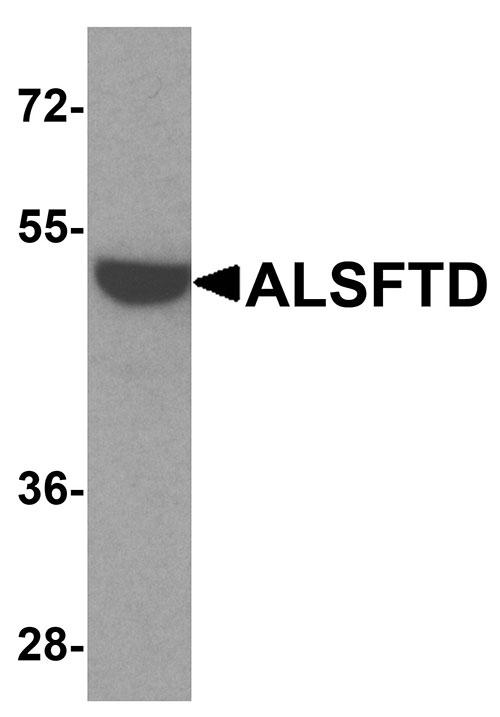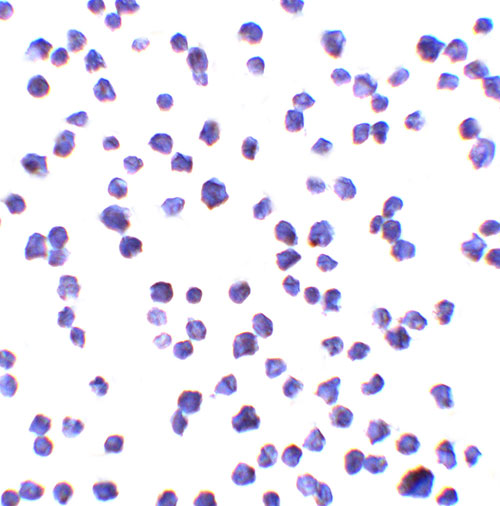ALSFTD Antibody
- 产品详情
- 实验流程
- 背景知识
Application
| WB, ICC, E |
|---|---|
| Primary Accession | Q96LT7 |
| Other Accession | NP_060795, 37039612 |
| Reactivity | Human, Mouse, Rat |
| Host | Rabbit |
| Clonality | Polyclonal |
| Isotype | IgG |
| Calculated MW | 54328 Da |
| Concentration (mg/ml) | 1 mg/mL |
| Conjugate | Unconjugated |
| Application Notes | ALSFTD antibody can be used for the detection of ALSFTD by Western blot at 1 - 2 µg/mL. Antibody can also be used for immunocytochemistry at 10 µg/ml. |
| Gene ID | 203228 |
|---|---|
| Other Names | Protein C9orf72, C9orf72 |
| Target/Specificity | ALSFTD; ALSFTD antibody is human, mouse and rat reactive. At least two isoforms are known to exist. |
| Reconstitution & Storage | ALSFTD antibody can be stored at 4℃ for three months and -20℃, stable for up to one year. |
| Precautions | ALSFTD Antibody is for research use only and not for use in diagnostic or therapeutic procedures. |
| Name | C9orf72 (HGNC:28337) |
|---|---|
| Function | Acts as a guanine-nucleotide releasing factor (GEF) for Rab GTPases by promoting the conversion of inactive RAB-GDP to the active form RAB-GTP (PubMed:27103069, PubMed:27193190, PubMed:27617292, PubMed:28195531, PubMed:37821429). Acts as a GEF for RAB39A which enables HOPS-mediated autophagosome-lysosome membrane tethering and fusion in mammalian autophagy (PubMed:37821429). Component of the C9orf72-SMCR8 complex where both subunits display GEF activity and that regulates autophagy (PubMed:27103069, PubMed:27193190, PubMed:27617292, PubMed:28195531). As part of the C9orf72-SMCR8-WDR41 (CSW) complex, functions as GEF for RAB8A and RAB39B, thereby promoting autophagosome maturation (PubMed:27103069). As part of the C9orf72-SMCR8 complex, also functions as GTPase activating protein (GAP) for RAB8A and RAB11A in vitro (PubMed:32303654). The C9orf72-SMCR8 complex also acts as a regulator of autophagy initiation by interacting with the ULK1/ATG1 kinase complex and modulating its protein kinase activity (PubMed:27617292). Promotes initiation of autophagy by regulating the RAB1A-dependent trafficking of the ULK1/ATG1 kinase complex to the phagophore which leads to autophagosome formation (PubMed:27334615). Acts as a regulator of mTORC1 signaling by promoting phosphorylation of mTORC1 substrates (PubMed:27559131). Plays a role in endosomal trafficking (PubMed:24549040). May be involved in regulating the maturation of phagosomes to lysosomes (By similarity). Promotes the lysosomal localization and lysosome-mediated degradation of CARM1 which leads to inhibition of starvation-induced lipid metabolism (By similarity). Regulates actin dynamics in motor neurons by inhibiting the GTP-binding activity of ARF6, leading to ARF6 inactivation (PubMed:27723745). This reduces the activity of the LIMK1 and LIMK2 kinases which are responsible for phosphorylation and inactivation of cofilin, leading to CFL1/cofilin activation (PubMed:27723745). Positively regulates axon extension and axon growth cone size in spinal motor neurons (PubMed:27723745). Required for SMCR8 protein expression and localization at pre- and post-synaptic compartments in the forebrain, also regulates protein abundance of RAB3A and GRIA1/GLUR1 in post-synaptic compartments in the forebrain and hippocampus (By similarity). Plays a role within the hematopoietic system in restricting inflammation and the development of autoimmunity (By similarity). |
| Cellular Location | Cytoplasm. Nucleus. Cytoplasm, P-body. Cytoplasm, Stress granule. Endosome Lysosome Cytoplasmic vesicle, autophagosome Autolysosome. Secreted. Cell projection, axon. Cell projection, growth cone. Perikaryon {ECO:0000250|UniProtKB:Q6DFW0}. Note=Detected in the cytoplasm of neurons from brain tissue (PubMed:21944778). Detected in the nucleus in fibroblasts (PubMed:21944779). During corticogenesis, transitions from being predominantly cytoplasmic to a more even nucleocytoplasmic distribution (By similarity). Majorly localized in cytosol under basal conditions (PubMed:37821429). Majorly gathered on autolysosomes structures under autophagy-induced conditions (PubMed:37821429) {ECO:0000250|UniProtKB:Q6DFW0, ECO:0000269|PubMed:21944778, ECO:0000269|PubMed:21944779, ECO:0000269|PubMed:27037575, ECO:0000269|PubMed:37821429} [Isoform 2]: Nucleus membrane; Peripheral membrane protein. Nucleus. Note=Detected at the nuclear membrane of cerebellar Purkinje cells and spinal motor neurons. Also shows diffuse nuclear expression in spinal motor neurons |
| Tissue Location | Both isoforms are widely expressed, including kidney, lung, liver, heart, testis and several brain regions, such as cerebellum. Also expressed in the frontal cortex and in lymphoblasts (at protein level). |
For Research Use Only. Not For Use In Diagnostic Procedures.
Provided below are standard protocols that you may find useful for product applications.
BACKGROUND
ALSFTD (C9orf72) is considered to play a role in gender determination (1). Hereditary hemorrhagic telangiectasia, which is characterized by harmful vascular defects, is associated with the chromosome 9 gene encoding endoglin protein, ENG (2). Familial dysautonomia is also associated with chromosome 9 though through the gene IKBKAP. Notably, chromosome 9 encompasses the largest interferon family gene cluster (3,4).
REFERENCES
Takada LT and Sha SJ. Neuropsychiatric features of C9orf72-associated behavioral variant frontotemporal dementia and frontotemporal dementia with motor neuron disease. Alzheimers Res. Ther. 2012; 4:38.
Coon EA, Whitwell JL, Parisi JE, et al. Right temporal variant frontotemporal dementia with motor neuron disease. J. Clin. Neurosci. 2012; 19:85-91.
Snowden JS, Rollinson S, Thompson JC, et al. Distinct clinical and pathological characteristics of frontotemporal dementia associated with C9ORF72 mutations. Brain 2012; 135:693-708.
Wen X, Tan W, Westergard T, et al. Antisense proline-arginine RAN dipeptides linked to C9ORF72-ALS/FTD form toxic nuclear aggregates that initiate in vitro and in vivo neuronal death. Neuron 2014; 84:1213-25.
终于等到您。ABCEPTA(百远生物)抗体产品。
点击下方“我要评价 ”按钮提交您的反馈信息,您的反馈和评价是我们最宝贵的财富之一,
我们将在1-3个工作日内处理您的反馈信息。
如有疑问,联系:0512-88856768 tech-china@abcepta.com.























 癌症的基本特征包括细胞增殖、血管生成、迁移、凋亡逃避机制和细胞永生等。找到癌症发生过程中这些通路的关键标记物和对应的抗体用于检测至关重要。
癌症的基本特征包括细胞增殖、血管生成、迁移、凋亡逃避机制和细胞永生等。找到癌症发生过程中这些通路的关键标记物和对应的抗体用于检测至关重要。 为您推荐一个泛素化位点预测神器——泛素化分析工具,可以为您的蛋白的泛素化位点作出预测和评分。
为您推荐一个泛素化位点预测神器——泛素化分析工具,可以为您的蛋白的泛素化位点作出预测和评分。 细胞自噬受体图形绘图工具为你的蛋白的细胞受体结合位点作出预测和评分,识别结合到自噬通路中的蛋白是非常重要的,便于让我们理解自噬在正常生理、病理过程中的作用,如发育、细胞分化、神经退化性疾病、压力条件下、感染和癌症。
细胞自噬受体图形绘图工具为你的蛋白的细胞受体结合位点作出预测和评分,识别结合到自噬通路中的蛋白是非常重要的,便于让我们理解自噬在正常生理、病理过程中的作用,如发育、细胞分化、神经退化性疾病、压力条件下、感染和癌症。







